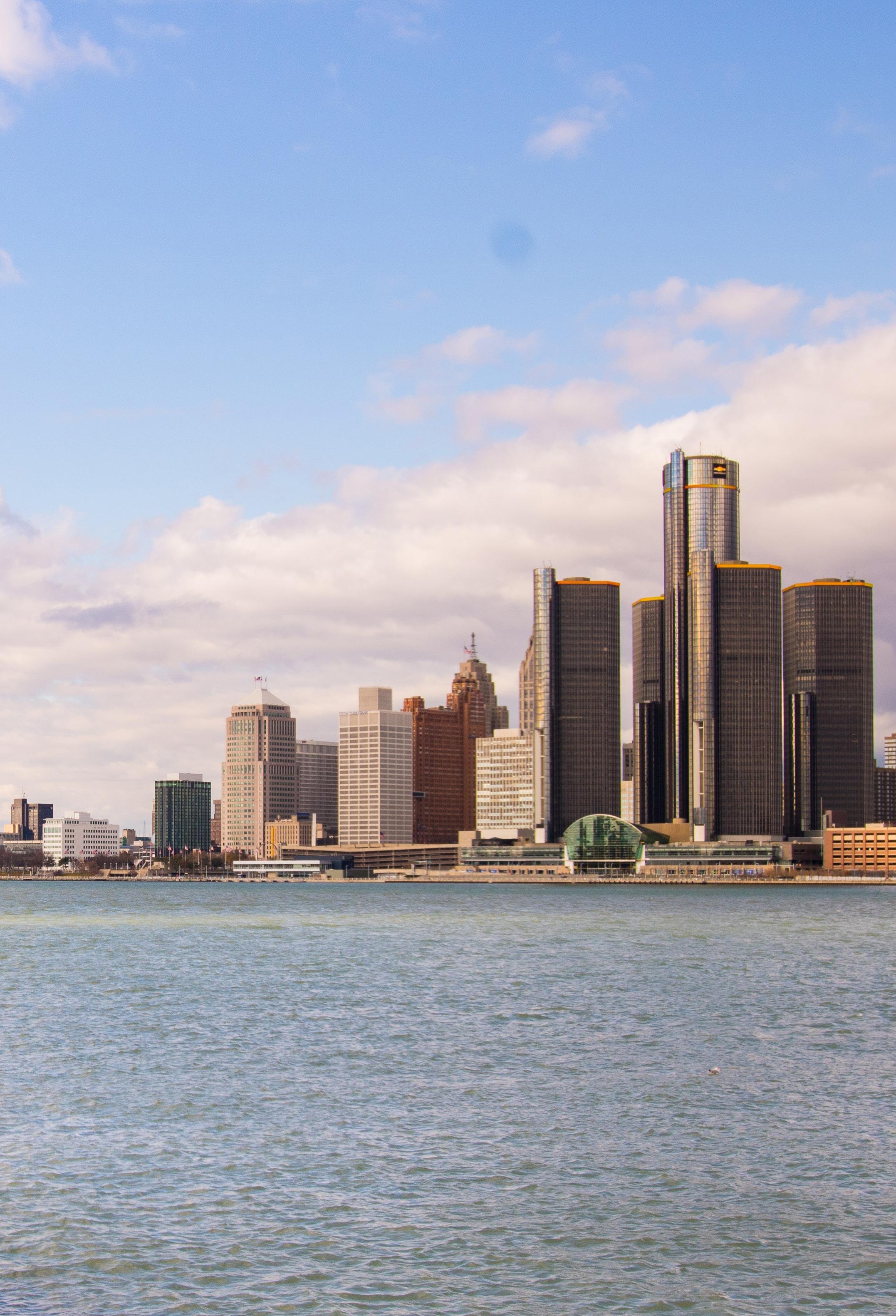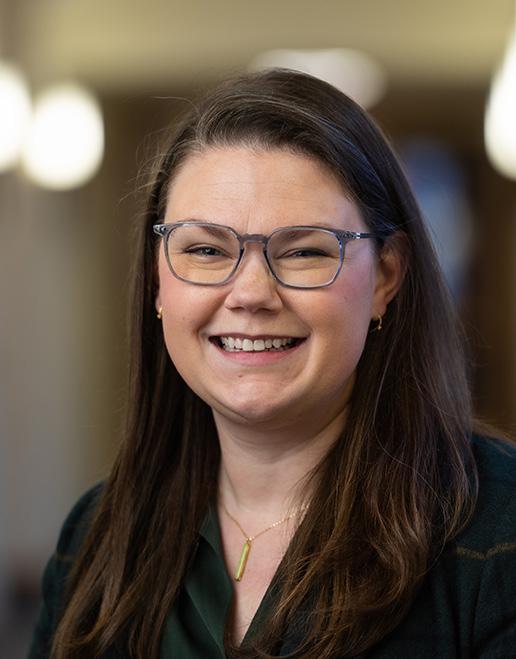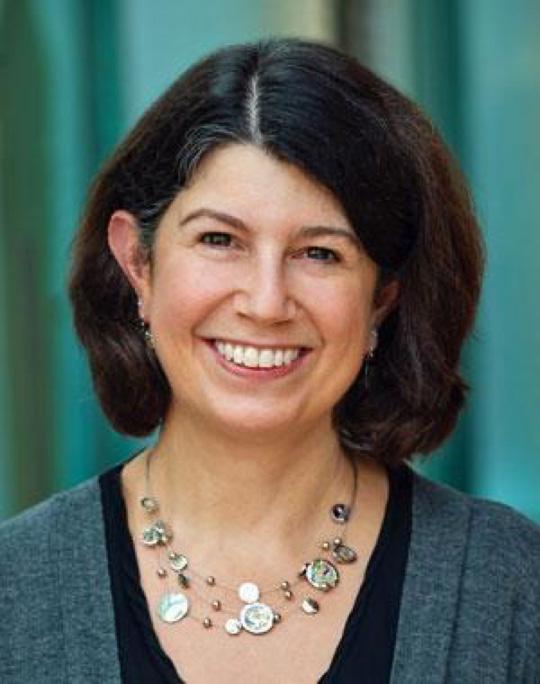2022 ANNUAL REPORT





It is hard to believe 2022 is over, and yet we’re thrilled to reflect back on all we have accomplished over the last year. From doubling the number of YPL Data & Policy Fellows working on strategic policy projects with the State of Michigan, to expanding our evaluation partnerships around youth mental health, we have deepened our commitment to turning policy research into action.
Our mission to improve lives in Michigan using rigorous social science research and action-oriented public-sector partnerships keeps us both motivated and very busy. The YPL team continues to grow to meet these demands. To that end, we were able to both add several new team members this past year, as well as promote one of our senior project managers - Megan Foster Friedman - to Deputy Director.




We are thrilled for the many possibilities these efforts will create for generating evidence-based change, and we couldn’t do it without your generous partnership and support. As we look ahead to 2023, we’re excited to continue working with you to build a better future for youth, families, and communities in Michigan and beyond.
In solidarity,
 Brian Jacob Co-director
Robin Jacob Co-director
Andrea Plevek Executive Director
Megan Foster Friedman Deputy Director
Brian Jacob Co-director
Robin Jacob Co-director
Andrea Plevek Executive Director
Megan Foster Friedman Deputy Director

The Lab received $6.4 million in new grant funding in 2022.
Arnold Ventures
U.S. Department of Education
Michigan Department of Health and Human Services
Max M. & Marjorie S. Fisher Foundation
University of Connecticut
$1.73M
SafeCare Evaluation
Reading Partners: Innovation and Scaling of a National Literacy Tutoring Program
Healthy Moms Healthy Babies MIHP Pilot Project Evaluation
Michigan Data & Policy Fellow: Home Visiting System
The Impacts of Early Childhood Science, Technology, and Engineering Interventions on Student Learning and Classroom Instruction: A Meta-Analysis
Michigan Department of Health and Human Services
American Education Research Association (AERA)

Strong Beginnings
A study of the Impacts of Grade Retention for English Learners in North Carolina
$407K
Michigan Justice Fund Public Welfare Foundation
Detroit Regional Chamber of Commerce
Arnold Ventures
$4.27M
U.S. Department of Education
TRAILS at Tides Center
Michigan Department of Education
Michigan Data & Policy Fellow: Youth Justice
Detroit Chamber - Youth Policy Lab Strategic Data Partnership Year 3
MI Pathways
TRAILS IES: Evaluating the Impact of TRAILS on Academic and Behavioral Health Outcomes in Detroit Public School Students
TRAILS Tides MIX: Evaluation of TRAILS Tier 1 Social Emotional Learning (SEL) Programming
Career and Technical Education
Within each category of work, projects are listed in descending order based on the size of the grant.

High 5s, the hands-on, small-group program developed by Dr. Robin Jacob and colleagues, is being implemented for kindergartners and first graders at Randall and Myers schools in the Taylor School District, located in Wayne County, to help close the achievement gap.

As most schools returned to in-person instruction with no or limited restrictions in the 2022-23 school year, concerns about the impacts of the COVID-19 pandemic on student educational outcomes, particularly for mathematics, continue. Early math skills have been shown to be highly predictive of later math achievement, so early intervention is one potentially powerful lever for ensuring the success of all students. In 2022, YPL continued its partnership with Taylor, MI and New York City schools on the High 5s kindergarten math enrichment program. Over 30 teachers in 10 schools are using the High 5s curriculum in their classrooms and participating in Professional Learning Communities (PLCs). Program updates based on feedback from the school partners have been well-received and administrators report that they are seeing changes in teacher practice because of their participation in the PLCs.
A study found the program increased kindergartners’ math performance by 15%. As the name suggests, students are given plenty of positive reinforcement as they progress.
Photo credit: Michigan Media“High 5s brought in all the pieces that helped children build on their success.”
- Cynthia Meszaros, Principal of Randall Elementary School
Since 2018, YPL has served as the evaluation partner for TRAILS (Transforming Research into Action to Improve the Lives of Students), a comprehensive school-based mental health program that trains school staff on evidence-based practices to promote the mental health and well being of their students. Over the past five years, TRAILS has experienced exponential growth as a program, and YPL’s evaluation work has also grown to match this expanding footprint.
In 2022, YPL and TRAILS received a $3.8 million grant from the U.S. Department of Education to fund an evaluation of TRAILS programming in Detroit Public Schools Community District. Over the next several years, YPL will be evaluating the impact of the TRAILS Early Intervention programming on student mental health and academic outcomes as it is implemented in over 70 DPSCD schools.
In 2021, TRAILS received $5 million in state funding to expand programming to intermediate school districts (ISDs) across the state of Michigan. A subset of schools receiving this funding are participating in a YPL-led evaluation of the TRAILS Social-Emotional Learning curriculum. In YPL’s evaluation, which launched at the beginning of the 2022-2023 school year, we will be exploring the impact of TRAILS
Social-Emotional Learning programming on student mental health and academic outcomes in over 35 schools in Genesee and Wayne counties. To date, over 6,000 students and 700 staff members from these schools have participated in baseline data collection activities.

As TRAILS increasingly engages in work outside of Michigan, YPL’s evaluation expertise is helping to describe implementation experiences across different school and community contexts. Forthcoming findings from YPL’s implementation study of the TRAILS Tier 1 universal education curriculum in three Colorado districts during the 2021-22 school year are promising. Staff provided positive feedback about, and expressed overall satisfaction with, the program. Preparation and delivery times were manageable. Staff perceived students as generally being engaged in the lessons and felt that the materials were age-appropriate. Buy-in from teachers is one of the critical components of the success of an educational intervention and these findings indicate that the TRAILS program is successful in achieving it.
In 2022, the Lab published various policy briefs and research findings, and continued research on upwards of 20 evaluations for our partners. Our findings will aid in strengthening programs that impact the futures of youth in Michigan.

Principal Investigator: Brian Jacob
YPL’s partnership with the Michigan Office of Career and Technical Education (OCTE) continues to yield actionable, policy-relevant information. Our 2022 policy brief on access to CTE programs across Michigan highlighted the fact that access to these career training programs is inequitable across racial and socioeconomic groups. This means that on average, students of color and economically disadvantaged students have fewer opportunities to begin developing skills in in-demand jobs during high school. YPL hopes to further expand this work in 2023.


Principal Investigator: Brian Jacob
YPL is developing a tool to help people make informed decisions about their educational and career options under the Futures for Frontliners (F4F) and MI Reconnect scholarship programs. MI Pathway shows users certificate and associate degree programs that train people to work in high-demand, high-wage jobs in their part of the state. Last year we partnered with the Michigan Department of Labor and Economic Opportunity Office of Sixty by 30 to distribute an early version of the tool to a subset of F4F and Reconnect applicants and collect user feedback. This year, we are again partnering with Sixty by 30 to distribute an updated version of MI Pathway to even more students to track outcomes that will help us understand how to better support adult learners as they navigate choices about where to enroll in college and which careers to pursue.

Principal Investigator: Robin Jacob
In the second year of the grant, Project AWARE Community sites and State partners continued improving the coordination of key actors, providing trainings to youth-facing adults, and increasing student access to mental health services. As evaluation partners, the Youth Policy Lab carefully worked to assess the effectiveness of Year 2 goals and contributed to improving the work with evidence-based insights and findings.

Principal Investigator: Brian Jacob
YPL is evaluating an in-home parent training and foster care prevention program called SafeCare. The program teaches caregivers skills in three key areas: how to interact in a positive manner with their children; recognizing home hazards to improve safety; and responding to health concerns. During 2022, the Lab met with DHHS staff at the State office and across 17 counties to plan the evaluation and implement the research design infrastructure. We expect that SafeCare will serve approximately 1,000 families over the course of this evaluation.

Principal Investigator: Robin Jacob
YPL published a policy brief on an MIHP community health worker pilot, including key findings, implications, and recommendations to enhance referral and outreach practices for home visiting service providers that could potentially benefit over 20,000 families in Michigan. In addition to this work, the FY2023 Michigan state budget provided another year of funding for a YPL-led evaluation of the Healthy Moms Healthy Babies MIHP Pilot, in which nearly 50 participating MIHP provider agencies receive additional reimbursement to provide enhanced home visiting services. YPL expects to deliver findings from the evaluation to the Michigan Legislature in 2024.


Co-Authors:
Anthony Bald, Joseph J. Doyle Jr., Max Gross, and Brian Jacob
Foster care provides substitute living arrangements to protect maltreated children. The practice is remarkably common: it is estimated that 5 percent of children in the United States are placed in foster care at some point during childhood. These children exhibit poor outcomes as children and adults, and economists have begun to estimate the causal relationship between foster care and life outcomes. This paper describes trade-offs in child welfare policy and provides background on the latest trends in foster care practice to highlight areas most in need of rigorous evidence.
CTE Virtual Summit Presentation, November 2022
Co-Authors: Brian Jacob and Jeremy Guardiola
Turning our 2022 CTE policy brief findings into action, YPL convened a virtual event in November with Michigan Department of Education (MDE) Office of CTE leadership, Career Education Planning District (CEPD) officials, UM faculty, and other key stakeholders to discuss the findings and develop strategies to address these opportunity gaps with partners across the state.

APPAM: Increasing Home Visiting Enrollment with Community Health Workers Presentation, November 2022

Co-Authors: Robin Jacob and Megan Foster Friedman
Findings from YPL’s 2021 MIHP community health worker pilot were presented at the 2022 APPAM (Association of Public Policy Analysis and Management) National Conference in Washington, DC. Earlier in 2022, YPL published a policy brief with recommendations to increase enrollment in home visiting through enhanced outreach practices.
In 2022, YPL doubled the number of fellows in its second cohort of the Data & Policy Fellowship program and expanded our State of Michigan partner agencies as well.
The Michigan Justice Fund is supporting a YPL fellow in the Michigan Department of Labor & Economic Opportunity (MDLEO) who identifies and advances policies and programs that improve employment and training outcomes for individuals involved in the justice system in Michigan.






The Max M. and Marjorie S. Fisher Foundation is supporting a Michigan Department of Health & Human Services (MDHHS) fellowship focusing on ways to better align and integrate home visiting programs, with the ultimate goal of improving maternal and infant health, as well as early childhood outcomes.

The Michigan Health Endowment Fund is supporting a fellow placed at the Maternal & Infant Health Program (MIHP) in MDHHS who is redesigning the program’s initial intake and assessment processes, and supporting statewide quality assessment and improvement.



The Michigan Justice Fund and the Public Welfare Foundation are supporting a fellow in the Michigan State Court Administrative Office (SCAO) who will develop systems and protocols for data collection, reporting, and risk screening for Michigan’s juvenile justice system.
 Aaron Sepulveda
Sara Elhasan
Adrianna High
Aaron Sepulveda
Sara Elhasan
Adrianna High
University of Michigan Youth Policy Lab

5201 Institute for Social Research
426 Thompson St Ann Arbor, MI 48104

734-647-8829

@YouthPolicyLab youthpolicylab.umich.edu
The University of Michigan Youth Policy Lab helps community and government agencies make better decisions by measuring what really works. We’re data experts who believe that government can and must do better for the people of Michigan. We’re also parents and community members who dream of a brighter future for all of our children. At the Youth Policy Lab, we’re working to make that dream a reality by strengthening programs that address some of our most pressing social challenges.
We recognize that the wellbeing of youth is intricately linked to the wellbeing of families and communities, so we engage in work that impacts all age ranges. Using rigorous evaluation design and data analysis, we’re working closely with our partners to build a future where public investments are based on strong evidence, so all Michiganders have a pathway to prosperity.
Support